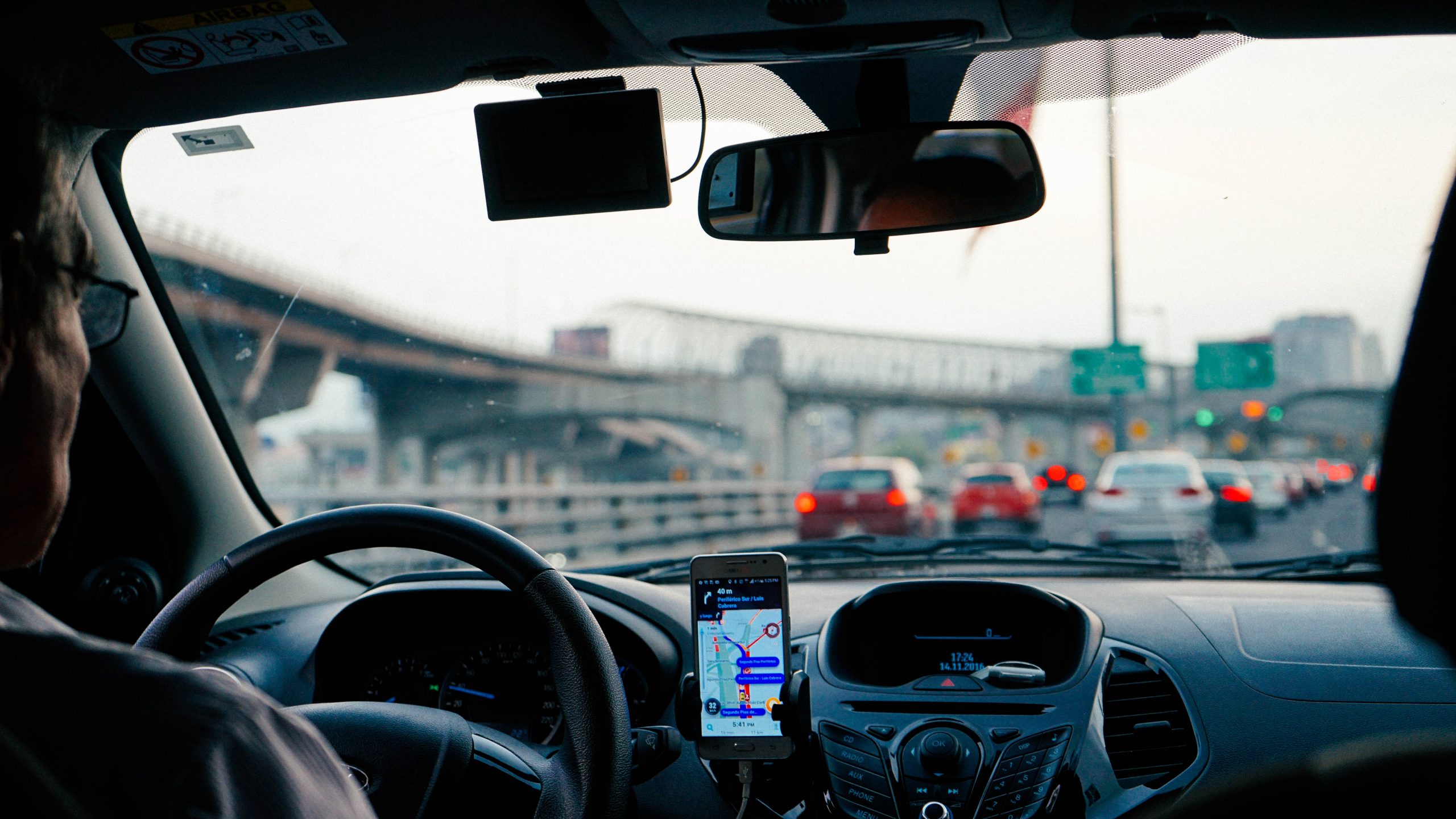The shared mobility industry has very quickly lost both passengers and profits as a result of the coronavirus outbreak but it can make a strong comeback with the right strategies, says McKinsey & Company.
“Consumers are indeed wary of shared mobility, given the risk of viral infection, and mobility-service providers (MSPs) must take decisive steps to address their concerns,” the consulting firm wrote in a recent report, citing the findings of its ongoing Global COVID-19 Automotive Consumer Survey.
They can potentially return to pre-pandemic service levels and even show stronger performance if the right decisions are made, it added.
The first two waves of the survey—which was conducted to determine if the drop in shared mobility would persist over the long term—each included more than 8,000 respondents spanning seven countries.
Read more: Ending COVID-19 Lockdowns Not Enough for Economic Rebound: Report
Here’s a summary of the findings of the study as well as McKinsey’s playbook for moving to the next normal:
Shifting Priorities
In part one of the survey, 47 percent of respondents said that the time to the destination was an important consideration before the pandemic. Only 14 percent of those surveyed stated that reducing the risk of infections was important.
“In the aftermath of the COVID-19 pandemic, the ability to reduce viral infection is now the most common consideration, cited by almost half of all respondents. The time to destination is cited as an important consideration by only 33 percent of respondents,” reads the report.
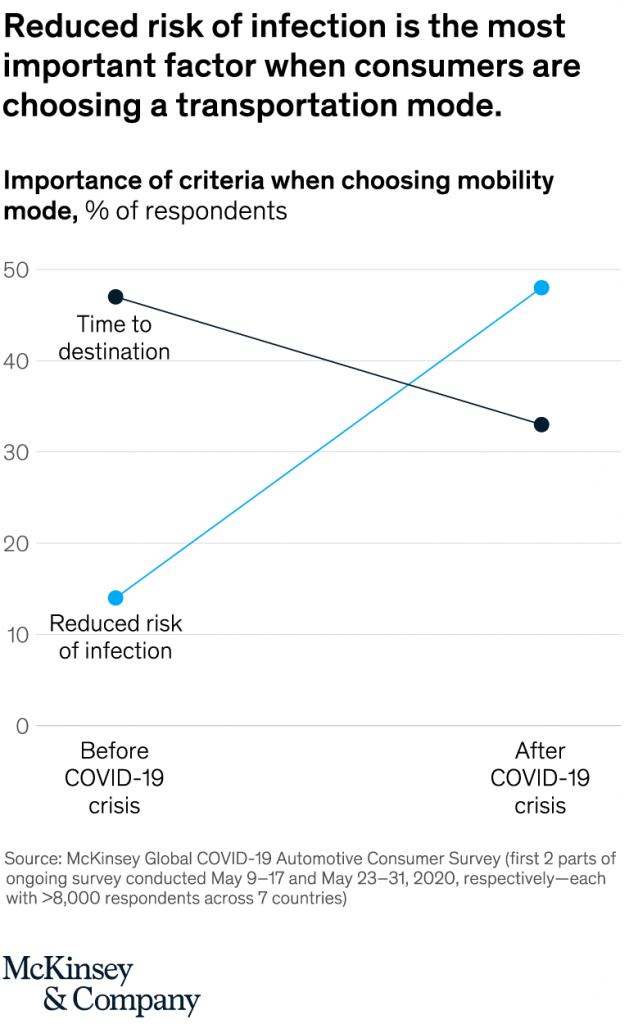
As an indication that staying healthy remains top of mind for global consumers, that sentiment remained largely unchanged—at 45 percent—in part two of our survey, conducted two weeks later.
The second part of the survey, which was conducted two weeks later, indicated that staying healthy remains top of mind for global consumers as that sentiment remained mostly unchanged—at 45 percent.
“The new consumer concerns have had a significant impact on the perception of MSPs. Only 5 to 8 percent of our survey respondents think that carsharing, ridesharing or shared micromobility are safe, from a health standpoint. Only 7 percent feel public transportation is safe. In contrast, 81 percent of respondents consider private vehicles safe,” according to McKinsey.
Given those safety concerns, people have changed their mobility patterns tremendously. For example, ride-hailing companies in multiple geographies have experienced 60 to 70 percent declines in passengers during the COVID-19 crisis.
It says the tremendous change in people’s mobility patterns has caused ride-hailing companies in multiple geographies to experience 60 to 70 percent declines in passengers during the corona crisis.
However, the consulting firm predicts that consumers may not always remain wary of shared mobility.
“People who want to avoid COVID-19 might eventually come to view ridesharing as a good alternative to more congested forms of mobility that make physical distancing difficult, such as public transportation.”
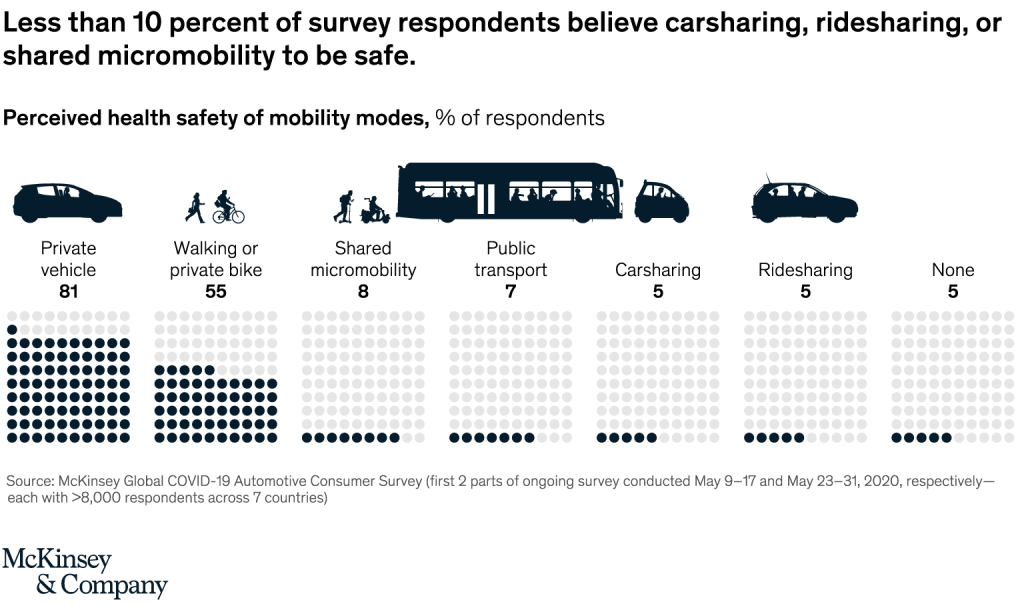
McKinsey believes that MSPs should react properly to the current challenges while preparing for the next normal if they want to seize potential opportunities in the coming months.
“Moreover, they should be ready for not only the potential next waves of COVID-19 but also other infections that might occur. Acting quickly and having a plan tailored to specific regional markets could be important,” it noted.
McKinsey’s analysts say the recovery of MSPs has broad societal implications as shared mobility can help reduce traffic congestion, air pollution, and greenhouse-gas emissions.
“The recovery of MSPs is also relevant to the OEMs (original equipment manufacturer) and suppliers that create vehicles and components, since they may need to improve their designs to increase safety,” the firm added.
Read more: Six Imperatives to Thrive in Asia-Pacific’s Retail Future
According to McKinsey, city and local officials also have an interest in the recovery of MSP since shared mobility could enhance life in other ways, such as making it easier to get around.
“To encourage MSP growth, officials must therefore monitor the industry closely and create appropriate regulations,” the report said.
A Playbook for MSPs
McKinsey says MSPs can respond to the current coronavirus pandemic and future crises by taking several actions split into three phases.
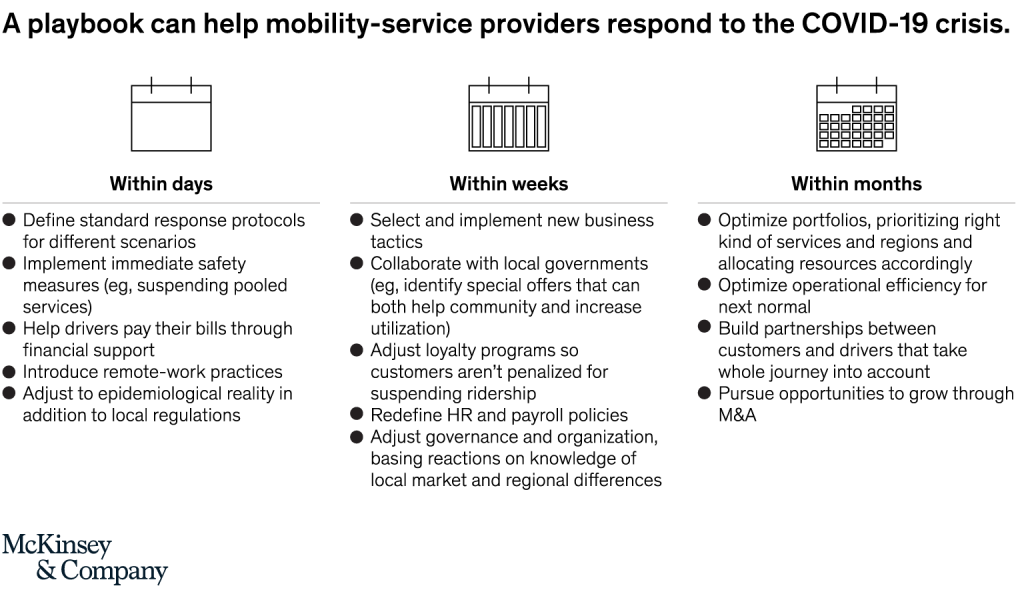
Within Days, Respond at Once
“As passenger demand plummeted and lockdowns challenged established work practices, MSP-industry leaders turned their immediate focus to surviving the turmoil without inflicting long-term damage on their businesses,” the consulting firm noted.
It says this model can serve them well if similar events occur in the future.
“Companies defined standard response protocols for different scenarios and implemented immediate safety measures, such as suspending pooled-vehicle services. They also helped keep their drivers financially solvent with support packages worth more than $10 million,” the firm added.
It said retaining drivers can help companies resume normal operations more quickly as lockdowns end.
Within Weeks, Cope With the Crisis
McKinsey’s analysts encourage MSPs to find ways to return to normal operating conditions while maintaining safety as the pandemic subsides.
“Although consumers perceive private vehicles as the most hygienic transport option, they aren’t available to everyone. In consequence, MSPs should ramp up marketing efforts, even though many people are still concerned about the safety of shared mobility,” they say.
In their view, the message should be that ride-hailing and carsharing services are viable alternatives to public transportation and private car ownership.
“Companies may also encourage robust levels of utilization through other measures, such as converting taxis to delivery vehicles for pharmacies and other stores,” McKinsey says.
It added that companies should act fast to shutter businesses that remain unprofitable while also creating potential new revenue streams through innovative business partnerships.
Months Later, Thrive in the Next Normal
“If MSPs can reimagine their business models, we believe that they have the potential to make a strong comeback. After the pandemic, as consumers resume everyday activities, such as dining out and going to the theater, ridesharing services might even surpass their previous levels of popularity,” McKinsey wrote.
Its survey shows that 15 percent of respondents expect to use ride-hailing services regularly after the pandemic. That figure was 14 percent before the crisis.
“MSPs would be wise to prioritize the right kinds of services for different regions and allocate resources accordingly. That may even include entering some non-mobility businesses, such as grocery e-commerce and package delivery, for added growth,” the report noted.
Also, McKinsey says mergers and acquisitions can provide established players and new entrants to grow.
Safety Is Paramount
According to the consulting firm, safety will be a top priority throughout all phases of the pandemic.
These are some measures that McKinsey recommends MSPs implement before, during, and after the trip:
– Canceling pooled services;
– Notifying customers that their cars are freshly sanitized and ventilated;
– Requiring all drivers and passengers to wear masks and using image-recognition technology to verify that the drivers remain masked throughout the journey;
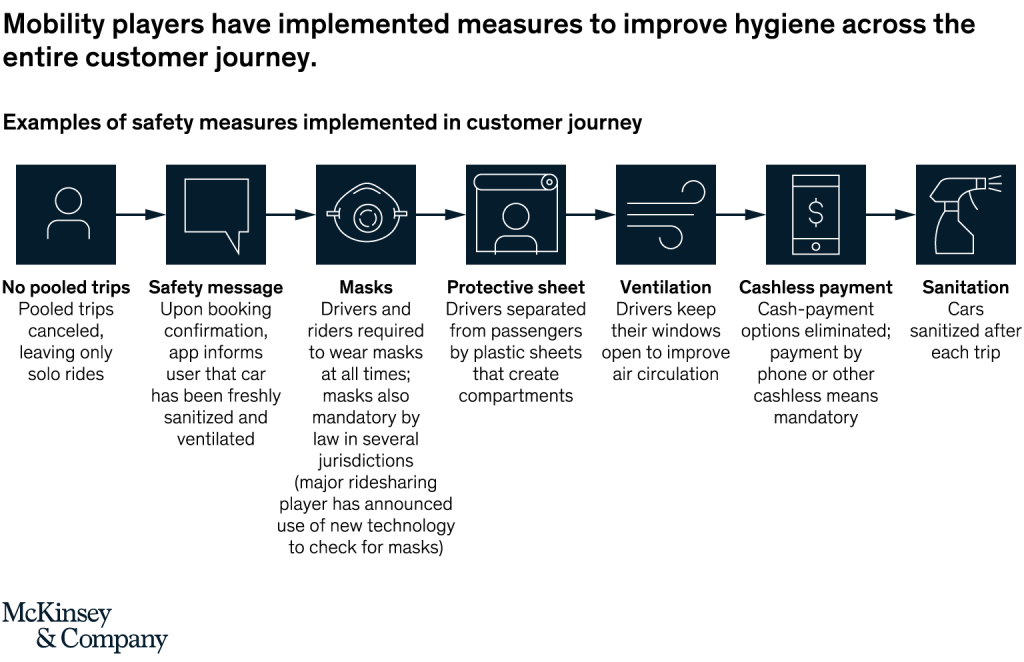
– Using a protective sheet to separating driver and passengers;
– Regularly opening windows to improve ventilation;
– Not giving customers the option to pay cash as contactless digital payments are perceived as safer;
– Tracing contacts in case of infections through data management; and
– Sanitizing cars between trips.
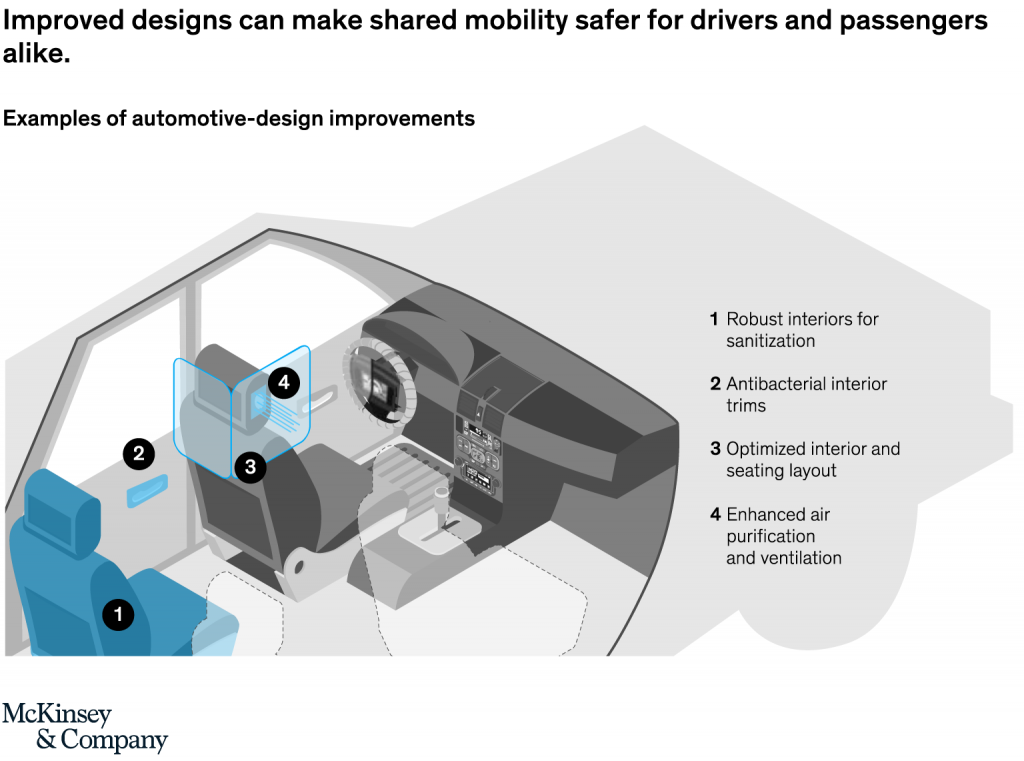
McKinsey says the inevitable conclusion is that services provide in the field of shared mobility must rethink their strategies and focus on partnerships, portfolio optimization, and enhanced vehicle design if they want to recover strongly from the current crisis.







